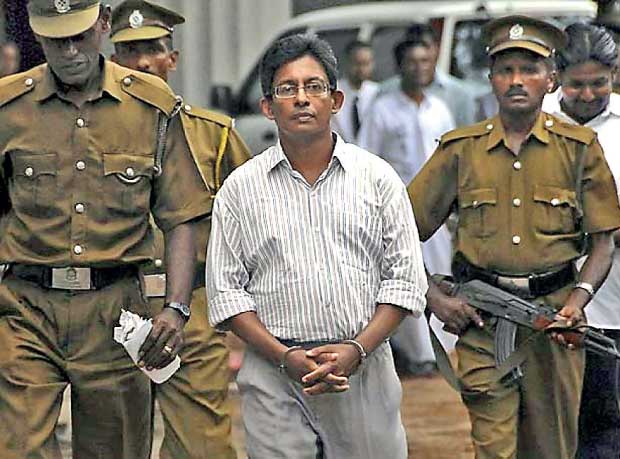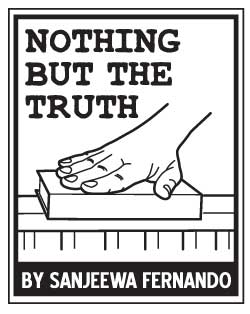Reply To:
Name - Reply Comment
Last Updated : 2024-04-27 00:40:00

Journalist J. S. Tissainayagam, a Tamil was arrested under the PTA in 2008 and later indicted on charges of inciting communal hatred.
The recent Supreme Court order handing over a Wellawatte property -- forfeited during the Rajapaksa regime on the instruction of the Police and taken over by the Terrorist Investigation Division -- to its rightful owners, is a typical indicator of the manner in which emergency regulations impinged the legal rights of the citizenry and the excesses that could be carried out with seeming impunity.
The Emergency (Proscription of the Liberation Tigers of Tamil Eelam) Regulations 2009 allowed the Minster of Defence (who incidentally was the President)to declare as forfeited any property supposedly used by terrorists and to be appropriated by the state. Although the section itself required due prior investigations to be made, but it transpired otherwise.
“All attended facts and circumstances considered, I hold that the forfeiture of the petitioners’ property by the order (P10E) made by His Excellency the President in his capacity as the Minister of Defence has infringed the petitioner’s fundamental right under Article 12(1) of the Constitution, and the said order forfeiting the premises bearing assessment no. 18/1 Chapel Lane Wellawatte, Colombo 6, in terms of Regulation 7(1) of the Emergency (proscription of the Liberation Tigers of Tamil Elam) Regulations 2009, is null and void and is hereby quashed,” Justice B P Aluwihare ruled, with Justices Priyasath Dep and Anil Gooneratne agreeing.
The fundamental Rights enshrined in Chapter 3 of the Constitution do allow restrictions, under emergency regulations as well as the Prevention of Terrorism Act. Yet Superior Court decisions have urged that such wide and sweeping powers vested on the state security apparatus be exercised only according to law and not otherwise. The law lays down procedural safeguards when encroaching upon the constitutionally guaranteed rights of subjects of the Supreme Law which is the Constitution itself. Besides, there are universally accepted rights which are absolute i.e. right to be free from torture, that could not be deprived by any domestic law.
In a constitutional democracy, which we supposedly are, citizens are not susceptible to arbitrary action by the State, be it with regard to their physical person, civil rights or property rights. The classical definition being so, one is not oblivious to the extraordinary circumstances wherein the State found itself and the attendant need to take swift, drastic, not necessarily democratic decisions. The citizenry were not totally averse to being compelled to sacrifice a degree of their Constitutional freedom in face of a dangerous and murderous enemy warring against the state and posing a threat to the very democratic mode of governance the Constitution envisaged; hence the putting up with restriction of their rights. When Chandrika Bandaranaike told the country to tighten their seat belts, it was not merely an allusion to the economical hardships attendant with war, but to this curtailment of civil rights as well.
The judiciary too seemed to have fallen in line with the Legislative and Executive arms of the State allowing the security apparatus sweeping and wide discretion in dealing with those suspected of involvement with terror. The plight of Tamil youth produced before law courts for obtaining detention orders is a case in point of the judiciary becoming a mere stamp of official endorsement of detention orders. As I have pointed out in an earlier article, not only the judiciary , but the entire criminal justice system capitulated to Executive action, to the detriment of the rights of the citizen. It appeared as if a Tamil terrorist suspect was, firstly, not a citizen of this country in terms of whose rights the justice system was a guardian and secondly, found guilty even before trial. A report by the International Bar Association raised concern over this state of affairs and lamented that their right, inter alia, for access to the law was blatantly denied where even the Legal Aid Service, which otherwise does a laudable service, had pursued a silent policy of not representing those youth, who, being brought to Colombo had very slim chance, if any, of being legally represented.
 Bleak also, was the Fundamental Rights horizon for of those who had come in to contact with the Emergency Regulations and the PTA provisions. A ‘deferential attitude’ towards the executive , as Jayantha De Almeida, Kishali Pinto Jayawardena and Gehan Gunatileke point out in their excellent book The Judicial Mind in Sri Lanka: Responding to the Protection of Minority Rights, was the order of the day and rarely did the Judiciary wish to remonstrate on behalf of the citizenry, whose judicial power, it happens to exercise.
Bleak also, was the Fundamental Rights horizon for of those who had come in to contact with the Emergency Regulations and the PTA provisions. A ‘deferential attitude’ towards the executive , as Jayantha De Almeida, Kishali Pinto Jayawardena and Gehan Gunatileke point out in their excellent book The Judicial Mind in Sri Lanka: Responding to the Protection of Minority Rights, was the order of the day and rarely did the Judiciary wish to remonstrate on behalf of the citizenry, whose judicial power, it happens to exercise.
One might retort firstly, that it was the past and such occurrences are not the order of the present day and secondly, that those were extraordinary times. But the draconian Emergency Regulations as well as the PTA still constitute part of our law book and could be resorted to any time. If times of war were extraordinary in nature, should it necessarily trigger an extraordinary collapse of the Criminal justice system, which in effect seems to be the case viz a viz all security calamities the nation has faced since independence.
At a time of much hype on Constitutional reforms and talk about the PTA being replaced by alternative counter terror legislation, it is crucial that the legislators are constantly reminded of the excesses committed during periods of civil turmoil under an emergency law regime in dealing with terrorism. Conceded, one must not be oblivious to modern day realities of the threats that terrorism, separatism, extremism and anarchy pose to the nation state and the consequent need to counter them firmly and swiftly; yet the proven delicateness of the judicial and criminal justice components of the rights equation in times of such pressure, too, must send red signals when drafting such legislation for the future.
The rightful owners of the property at Wellawatte are an extremely lucky minuscule portion of our citizenry, hard done by the draconian actions of the State during emergency times; the overwhelming majority have hardly had access to, let alone success in, a court house to vindicate their rights. Some have lost their lives, others their loved ones, yet others have left even their ancestral homes preferring self-imposed exile over persecution. Some youth rounded up on no definite charges at all, languish in detention, seeking either prosecution or release, neither of which , seems forthcoming.
The Supreme Court decision emphasizes that the discretion vested in any State authority, should be exercised cautiously, based on facts and after investigation, which in this case were blatantly absent. As regards drastic measures depriving individuals of their property, in particular, the authority should be doubly sure, as it could impinge on the right of a person to equal protection under the law in terms of Article 12 (1) of the Constitution. Yet again, and invariably, it bottles down to the question of the political will of the authority concerned; whether it is concerned about the rights of the subjects or in utter disregard to them. If the general modus operandi is more reflective of the latter, the outcome is hardly surprising.
Does any one beg to differ?
The Supreme Court decision in Case No. SC FR Application 15/2010 is available online athttp://supremecourt.lk/images/documents/sc_fr_15_2010.pdf
(nothingbutthetruthdm@yahoo.com)
Thanga Wednesday, 06 September 2017 04:45 AM
Mahinda Rajapaksa as president always thought he is above law. He made the judiciary subservient to the executive president. The judge who sentenced Tissanayagam 10 years hard labour for writing two articles during peace time should be arrested to brought to justice by the yahapalanaya government.

Add comment
Comments will be edited (grammar, spelling and slang) and authorized at the discretion of Daily Mirror online. The website also has the right not to publish selected comments.
Reply To:
Name - Reply Comment
US authorities are currently reviewing the manifest of every cargo aboard MV
On March 26, a couple arriving from Thailand was arrested with 88 live animal
According to villagers from Naula-Moragolla out of 105 families 80 can afford
Is the situation in Sri Lanka so grim that locals harbour hope that they coul

8 hours ago
26 Apr 2024